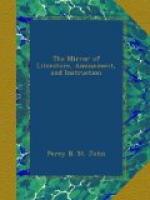The advantages, on the other hand, which emigrants may enjoy in our American colonies are numerous and important. The first and great advantage is constant employment, whether labour be required for the improvement of their own land, or that of an employer. Constant employment bestows vigour on the bodily frame, and contentment to the mind. Labour, it is true, is not so high priced in Canada as it was when labourers were scarcer, but still an able-bodied agricultural labourer can get 2s. 6d. a-day, and skilful mechanics as much as 5s. and their victuals. The soil being quite new and fresh, it is naturally fertile, and it will give a good return for the labour bestowed upon it, and, of course, the exercise of superior skill and industry will produce extraordinary results. The climate in summer, too, being so very superior to this country, that many products of the soil may be obtained there with little trouble, which cost much trouble and expense here. Not only the ordinary grains can be grown to perfection, but maize, garden vegetable produce, and fruits of all kinds, grow luxuriantly. It is found, however, that the grafted trees from this country thrive much better, and produce more and better fruits, than the natural trees of the country. Abundance of provisions, then, for the largest families may be always obtained in our American colonies during the whole year. This assurance of abundance not only produces contentment of mind, but endues that spirit of independence which forms a valuable ingredient in a manly character. All accounts agree in the happy and contented state in which the emigrants are found, even in the midst of toil. Ample future provision for the family soothes the mind of the emigrant in the hour of dissolution. Not a trifling advantage consists in the absence of all vexatious imposts or burdens. There are no stamp-duties. Taxes there must be in all civilized communities, but there they are “trifles light as air.” One dollar per hundred acres of land is about the annual amount of taxation to an emigrant. Besides all that, he may make his own malt, brew his own beer, make his own candles and sugar, raise his own tobacco, and tan his own leather, without dread of being exchequered. And last, though not least, of these advantages, is the almost unlimited space which lies open for settlements. For many generations yet unborn, good land and constant employment will await the arrival of the emigrant in the forest lands of our American colonies. These advantages counterbalance the evils of a new country, but, combining the former with the latter, emigrants should check the ardour of enthusiasm. They must consider that perseverance alone will insure success. They must make up their mind to work ere they can prosper. If they wish to possess land of their own, they must take money with them to give in exchange for that land. Having obtained the land which they desired to possess, they must consent to endure hardships before they can obtain




